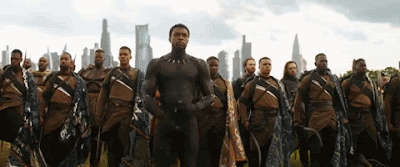or
"Bigger. Stronger. Faster. Further."
Dr. George Miller is fast approaching the age of 80 years old, and whereas most film directors lucky enough to be working at that age have a tendency to make their films slower-paced and more contemplative in nature the older they get, he has gone the opposite direction (and faster!) making movies more expansive and more energetic the more he works.
Not only that, Miller's movies are getting denser—as in having more depth (rather than merely being stupid, which they most certainly are not). There are sub-texts (that aren't merely superficial call-backs to other movies, but to Myth and literature), amazing images (that sometimes recall the after-image of a Fritz Lang or of William Wyler religious epics), a sumptuousness of detail—in environments, costuming, machines—that can't be contained by mere budgets, and a pace that has only gotten faster and more daring as the years have gone on, while also NOT depriving any essential information for an audience to understand exactly what is happening.
George Miller, at 79, is still showing young turk wannabe directors not only how to make movies (and good ones!), but leaving them in his considerable cloud of dust as he out-paces and out-flanks them.
Now, after a jaw-dropping return to making live action movies (after a 17 year absence—during which he made two "Happy Feet" animated features) with his Mad Max: Fury Road (big hit!) and Three Thousand Years of Longing (no one saw it), he's back to his Australian dystopia with a prequel to Fury Road called Furiosa: a Mad Max Saga, relating the origin story of Charlize Theron's amazon fury-imperator (now played by Anya Taylor-Joy).
Set in five chapters (1. The Poles of Possibilities; 2. Lessons from the Wasteland; 3. The Stowaway; 4. Homeward; 5. Beyond Vengeance), it tells the story of Furiosa's abduction as a child from "The Green Place of Many Mothers", kept as a trophy by the Wasteland biker-warlord, Dr. Dementus (Chris Hemsworth—in a performance somewhere between a Bond villain and a mad Peter O'Toole), her trade to the Citadel to become a bride of Immortan Joe (now played by Lachy Hulme), and her escape to hide in plain sight as a Citadel worker.Her ultimate goal is to return to "The Green Place" (we learned what became of that in Fury Road) but, for the purposes of this movie, she is concerned with vengeance against Dementus as the off-kilter boss-wannabe had killed her mother, who had come after the bikers in an attempt to get Furiosa back. And to do that, she must first shed her disguise and become mobile—which she does in "The Stowaway" section (which is one big chase sequence), gaining access to Dementus' "War Rig" and assisting its driver Praetorian Jack (Tom Burke) to ward off pirate attacks in its supply efforts across The Wasteland.
What we've got here is a feminist version of The Searchers, where the kidnap-victim takes it upon herself to free herself from her captors, rather than waiting around for someone else to do it (hard to do as her only known relative was her mother). And along the way, we learn how Furiosa gained her "mad" skills, and how she managed to lose her left arm (and its significance to her quest).Furiosa has all the hallmarks of a "Mad Max" movie—despite having only one shot of "Max" (Jacob Tomuri) in the entire thing. It careens, it propels, it defies expectations—except to pump adrenaline and amaze in how it builds its world out of spare parts (Dementus drives a chariot pulled by three motorcycles)—and does the vast majority of it using practical effects (a few of the explosions and other bits of business are augmented by CGI) and some of the most daredevil-ish stuntmen on the planet.But, Miller is pushing the film-making illusions, as well. There's always been a bit of under-cranking (the act of filming at a lower frame-rate to make the action appear faster on the screen) in the "Mad Max" films, but here Miller takes it even farther. If Fury Road was a "10" in that department, Miller risks taking it to "12." There's always the danger of making things look cartoonish that way, but Miller, at this point, doesn't seem to care. There are parts of Furiosa that feel like you're watching it dosed on Ambien, so hyper-kinetic is the result, and the effect is unnerving. But, it works subjectively, despite the objections of some purists.It's also one of the most "in-your-face" movies in my memory, with quite a few shots that literally zoom in to characters' faces and might cause your foot to instinctively stamp on an imaginary brake pedal (there's one that propels into a face as it explodes in the last frame!). It is dizzying and quite the rush, all the more so because Miller is a director who keeps you aware of where things are and where they relate to the camera. There is nothing scatter-shot about what he does; the only hap-hazardness is what he has happen on-screen.It's great. Wonderful story-telling. But, it's not for the sensitive—"sequences of strong violence and grisly images" and all that—but apocalyptic dystopias rarely are. And Furiosa is a nice little dervish-y spin on the Mad Max Universe and a fresh take on its tropes.
Miller's got another story ready to film out of this Fury Road saga. It'll probably be even more dynamic. Miller, approaching 80, isn't one to slow down.

























































